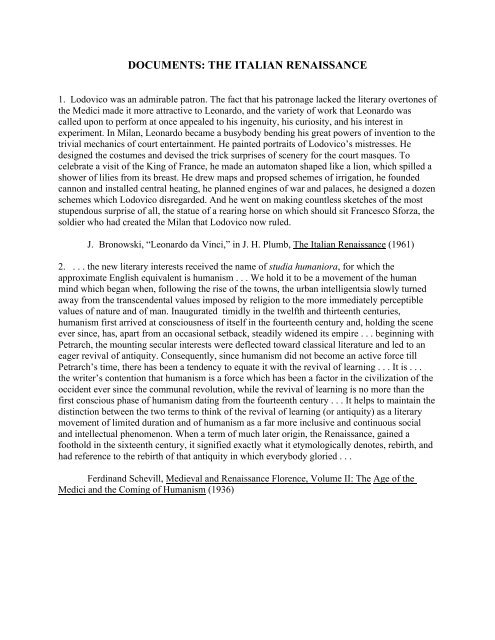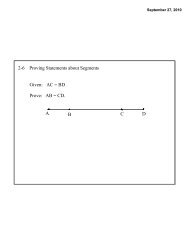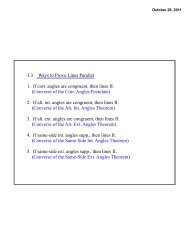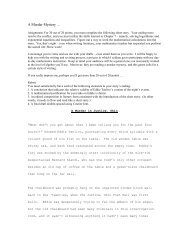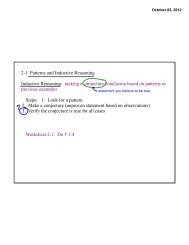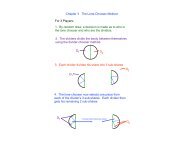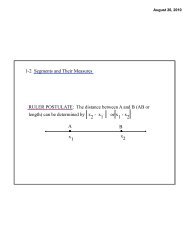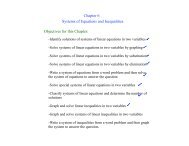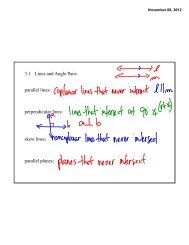DOCUMENTS: THE ITALIAN RENAISSANCE
DOCUMENTS: THE ITALIAN RENAISSANCE
DOCUMENTS: THE ITALIAN RENAISSANCE
You also want an ePaper? Increase the reach of your titles
YUMPU automatically turns print PDFs into web optimized ePapers that Google loves.
<strong>DOCUMENTS</strong>: <strong>THE</strong> <strong>ITALIAN</strong> <strong>RENAISSANCE</strong><br />
1. Lodovico was an admirable patron. The fact that his patronage lacked the literary overtones of<br />
the Medici made it more attractive to Leonardo, and the variety of work that Leonardo was<br />
called upon to perform at once appealed to his ingenuity, his curiosity, and his interest in<br />
experiment. In Milan, Leonardo became a busybody bending his great powers of invention to the<br />
trivial mechanics of court entertainment. He painted portraits of Lodovico’s mistresses. He<br />
designed the costumes and devised the trick surprises of scenery for the court masques. To<br />
celebrate a visit of the King of France, he made an automaton shaped like a lion, which spilled a<br />
shower of lilies from its breast. He drew maps and propsed schemes of irrigation, he founded<br />
cannon and installed central heating, he planned engines of war and palaces, he designed a dozen<br />
schemes which Lodovico disregarded. And he went on making countless sketches of the most<br />
stupendous surprise of all, the statue of a rearing horse on which should sit Francesco Sforza, the<br />
soldier who had created the Milan that Lodovico now ruled.<br />
J. Bronowski, “Leonardo da Vinci,” in J. H. Plumb, The Italian Renaissance (1961)<br />
2. . . . the new literary interests received the name of studia humaniora, for which the<br />
approximate English equivalent is humanism . . . We hold it to be a movement of the human<br />
mind which began when, following the rise of the towns, the urban intelligentsia slowly turned<br />
away from the transcendental values imposed by religion to the more immediately perceptible<br />
values of nature and of man. Inaugurated timidly in the twelfth and thirteenth centuries,<br />
humanism first arrived at consciousness of itself in the fourteenth century and, holding the scene<br />
ever since, has, apart from an occasional setback, steadily widened its empire . . . beginning with<br />
Petrarch, the mounting secular interests were deflected toward classical literature and led to an<br />
eager revival of antiquity. Consequently, since humanism did not become an active force till<br />
Petrarch’s time, there has been a tendency to equate it with the revival of learning . . . It is . . .<br />
the writer’s contention that humanism is a force which has been a factor in the civilization of the<br />
occident ever since the communal revolution, while the revival of learning is no more than the<br />
first conscious phase of humanism dating from the fourteenth century . . . It helps to maintain the<br />
distinction between the two terms to think of the revival of learning (or antiquity) as a literary<br />
movement of limited duration and of humanism as a far more inclusive and continuous social<br />
and intellectual phenomenon. When a term of much later origin, the Renaissance, gained a<br />
foothold in the sixteenth century, it signified exactly what it etymologically denotes, rebirth, and<br />
had reference to the rebirth of that antiquity in which everybody gloried . . .<br />
Ferdinand Schevill, Medieval and Renaissance Florence, Volume II: The Age of the<br />
Medici and the Coming of Humanism (1936)
3. We call those studies liberal which are worthy of a free man; those studies by which we attain<br />
and practice virtue and wisdom; that education which calls forth, trains, and develops those<br />
highest gifts of body and of mind which enoble mem . . .<br />
Peter Paul Vergerio (1370 -1444), quoted in W.H. Woodward, Vittorino da Feltre and<br />
other Humanist Educators, Cambridge University Press (1897)<br />
4. . . . His reading was a communion with ancient spirits, alive in books. He wrote them personal<br />
letters; he called Cicero his father, Virgil his brother . . . He discovered several lost works of<br />
Cicero and gave them to his world. With Boccacio, he engaged an Eastern scholar to translate<br />
Homer into Latin. He loved to examine and caress Greek books, though unable to undestand<br />
them, and he tried in vain to learn the language.<br />
We call him the chief reviver of ancient learning. His example stimulated others to collect the<br />
classics and to copy them or have them copied. He aroused also a vogue for the critical study of<br />
ancient texts, which abounded with copyists’ errors . . .<br />
His critical sense was keen. He called a treasured document of Julius Cæsar a fake; he read an<br />
absurd, ill-written life of Saint Simplicianus and said outright that he did not believe a word of it.<br />
He opposed supernatural explanations, preferring to rest on plain reason . . . He rejected<br />
astrology (which was formally taught in Italian universities) because it denied human liberty.<br />
“Can celestial bodies deviate from their courses, break all their laws, run in irregular orbits, to<br />
give warnings to men Ridiculous!” He was skeptical even of miracles, since so often lies,<br />
follies, and frauds hide under the veil of religion and sanctity . . .<br />
. . . he taught the blending of faith and love with exact, rational, critical method, as he blended<br />
in himself the poet and the scholar . . .<br />
. . . This attitude, this union of love and reason, is humanism. Properly we call Petrarch the<br />
first humanist.<br />
Morris Bishop, “Petrarch”, in Plumb, The Italian Renaissance (1961)<br />
5. You are well aware that from early boyhood of all the writers of all ages and<br />
races the one whom I most admire and love is Cicero. You agree with me in<br />
this respect as well as in so many others. I am not afraid of being considered<br />
a poor Christian by declaring myself so much a Ciceronian. (This is an<br />
allusion to a famous vision of St. Jerome in which God told him: “You are<br />
a Ciceronian and therefore not a Christian.”) To my knowledge, Cicero<br />
never wrote one word that would conflict with the principles proclaimed by<br />
Christ. If, perchance, his words contained anything contrary to Christ’s<br />
doctrine, that one fact would be sufficient to destroy my belief in Cicero<br />
and in Aristotle and in Plato . . .
Christ is my God; Cicero is the prince of the language I use. I grant you that<br />
these ideas are widely separated, but I deny that they are in conflict with<br />
each other. Christ is the word, and the virtue, and the virtue and the<br />
wisdom of God the Father. Cicero has written much on the speech of men,<br />
on the virtues of men, and on the wisdom of men - statements that are true<br />
and therefore surely acceptable to the God of truth.<br />
Petrarch, Letters to Classical Authors (1358)<br />
6. Coluccio and his contemporary Florentine scholars are now often called civic humanists,<br />
since they stressed that participation in public affairs is essential for full human development.<br />
They linked their praise of the active life with a defense of the republican liberty of Florence,<br />
then threatened by the despot Gian Galeazzo of Milan. The humanists argued that human<br />
advance depends on a kind of community dialogue, which allows individuals to learn from one<br />
another. To participate in such a dialogue, the educated citizen needs wisdom founded on sound<br />
moral philosophy and also eloquence, without which knowledge will remain socially barren. The<br />
best education imparts both qualities, which are themselves best exemplified by the ancient<br />
classics. Moreover, if human progress depends on dialogue, the best political institutions are<br />
those that invite the participation of citizens in the councils of government. The republican form<br />
of government was therefore deemed superior to the despotism represented by Gian Galeazzo. In<br />
one integrated argument the civic humanists thus defended the capital importance of training in<br />
the classics, the superiority of the active life, and the value of Florentine republic institutions.<br />
Mortimer Chambers, The Western Experience, Fifth Edition (199<br />
7. The other creatures have a defined nature which is fixed within limits<br />
prescribed by me. You, unhampered, may determine your own limits<br />
according to your own will, into whose power I have placed you. I have set<br />
you in the center of the world; from there you can better see whatever is<br />
in the world. I have made you neither heavenly or terrestrial, neither mortal<br />
nor immortal, in order that, like a free and sovereign artificer, you can<br />
fashion your own form out of your own substance. You can degenerate to the<br />
lower order of brutes; you can, according to your own will, recreate yourself<br />
in in those higher creatures which art devine.<br />
Pico della Mirandola, Oration on the Dignity of Man (1485)<br />
8. You Christians should always have the Gospel with you, I do not mean the book, but the<br />
spirit, for if you do not possess the spirit of grace and yet carry with you the whole book, of what<br />
advantage is it to you And again, all the more foolish are they who carry round their necks<br />
Breviaries, notes, tracts, and writings, until they look like pedlars going to a fair. Charity does<br />
not consist in the writing of papers. The true books of Christ are the Apostles and saints, and true<br />
reading consists in imitating their lives. But in these days men are like books made by the Devil.<br />
They speak against pride and ambition and yet they are immersed in them up to their eyes. They
preach chastity and maintain concubines. They enjoin fasting and partake of splendid feasts . . .<br />
Only look today at the prelates. They are tied to earthly vanities. They love them. The cure of<br />
souls is no longer their concern . . . In the Primitive Church the chalices were made of wood and<br />
the prelates of gold - today - chalices of gold, prelates of wood!<br />
P. Miscatelli, Savonarola (1930)<br />
9. The story of Savonarola is a mixture of tragedy and hysteria, in which a genuine pity for<br />
man’s condition became enraveled in hate and muddled by political intrigue. His denunciation of<br />
worldliness, his childish burning of vanities, his fiery condemnation of a lazy and corrupt clergy,<br />
were part of a threnody of the life of Europe, frequently heard, frequently forgotten; but<br />
Savonarola spoke at a time when the young Piero de Medici was displaying a singular lack of his<br />
family’s genius. Behind Savonarola loomed the discontented poor, who were eager for a change,<br />
eager for secular as well as religious hope. Those families whom the Medici had excluded and<br />
despised knew how to manipulate this superlative demagogue, this being whose wild sermons<br />
could inflame a multitude. So what started in evangelism finished in political revolution.<br />
The little people, the piagnoni (snivelers) as the old oligarchs called them, became a power in<br />
the land. Popolo e Libertà frequently echoed in the Piazza<br />
. . . in Florence . . . the oligarchs disliked both the rantings of Savonarola and the government of<br />
the people; in the wings lurked the exiled Medici - they were powerful in Rome. The inevitable<br />
end came: the rack and the fagot for Savonarola, the defeat of his piagnoni; and in the fullness of<br />
time, the return of the Medici.<br />
The whole Savonarola episode is a curious mixture of idealism, ineptitude, and iniquity.<br />
Certainly Savonarola wanted a Florentine government that represented more fully the whole<br />
citizenship - the poor and the dispossessed as well as the rich and the powerful. He also hated<br />
life, grew drunk on his own megalomaniac visions, preferred prophecy to policy, and welcomed<br />
the disasters he had done so much to promote. Ignorance married to prejudice, blind hatred<br />
linked with a disgust for life, proved an unsatisfactory basis for statesmanship, even when<br />
practiced by a saint.<br />
J.H. Plumb, The Italian Renaissance (1961)<br />
10. I judge the principal and true profession of a Courtier ought to be in feats of arms, the which<br />
above all I will have him to practice lively . . .<br />
(The Courtier should excel) . . . in those studies which they call Humanity,<br />
and . . . have not only the understanding of the Latin tongue, but also of the Greek, because of<br />
the many and sundry things that with great excellency are written in it. Let him much exercise<br />
himself in poets, and no less in orators and historiographers, and also in writing both rhyme and<br />
prose, and especially in our vulgar tongue . . .<br />
Baldassare Castiglione, The Courtier (1523)
11. Naturally he must excel, but should avoid seeming to do so; above all, he must cultivate<br />
grace of movement, and this Castiglione thought could only be achieved by the practice of<br />
sprezzatura, nonchalance, “so as to conceal all art and make whatever is done and said appear to<br />
be without effort and without almost any thought about it.” Polish was as necessary as prowess,<br />
in exercises of the mind as well as the body. The gentleman was, of course, literate,<br />
knowledgeable about the classics, and eloquent . . .<br />
After the mind and body came sensibility, connoisseurship. According to Castiglione, a<br />
gentleman might even be taught to paint - as, indeed, the Greek and Roman aristocrats had been.<br />
Music and its appreciation were necessities; music composed the mind, directed thought to<br />
gentle pleasures, inculcated a love of harmony . . . The lighter expressions of art as well as the<br />
weightier were proper pastimes - dances, masques, the parade of rhetoric, and, naturally, the<br />
pursuit of love (love, however, not lust). The conquest of the heart, the possession of the mind,<br />
were a courtier’s targets . . .<br />
J.H. Plumb, The Italian Renaissance (1961)<br />
12. . . . (Men) are ungrateful, changeable, simulators and dissimulators, runaways in danger,<br />
eager for gain; while you do well by them they are all yours; they offer you their blood, their<br />
property, their lives, their children . . . when need is far off; but when it comes near you, they<br />
turn about . . .<br />
For a man who, in all respects, will carry out only his professions of good, will be apt to be<br />
ruined amongst so many who are evil. A prince therefore who desires to maintain himself must<br />
learn to be not always good, but to be so or not as necessity may require . . .<br />
Is it better to be loved than feared, or feared than loved It may be answered<br />
that one should wish to be both, but it is much safer to be feared than loved<br />
when one of the two must be chosen. Men on the whole are ungrateful,<br />
fickle, false, cowards, covetous. As long as you succeed they are yours<br />
entirely . . . Men have fewer scruples in offending one who is beloved<br />
than one who is feared, for love is preserved by the link of obligation which,<br />
owing to the baseness of men, is broken at every opportunity for their<br />
advantage, but fear preserves you by a dread of punishment which never<br />
fails . .<br />
Nevertheless, a prince should inspire fear in such a way that if he does not<br />
win love, he avoids hatred; because he can endure very well being feared<br />
while he is not hated, and this will be true as long as he abstains from<br />
taking the property of his subjects or his women. But when it is necessary<br />
for him to take the life of someone, he must do it with proper justification<br />
and for manifest cause, and above everything he must keep his hands off<br />
the property of others, because men more quickly forget the death of their<br />
father than the loss of their heritage . . .
Since . . . a prince is necessitated to play the animal well, he chooses among the beasts the fox<br />
and the lion, because the lion does not protect himself from traps; the fox does not protect<br />
himself from the wolves. The prince must be a fox, therefore, to recognize the traps and a lion to<br />
frighten the wolves . . . By no means can a prudent ruler keep his word - and he does not - when<br />
to keep it works against himself and when the reasons that made him promise are annulled. If all<br />
men were good, this maxim would not be good, but because they are bad and do not keep their<br />
promises to you, you likewise do not have to keep yours to them.<br />
Niccolò Machiavelli, The Prince (1513)<br />
13. . . . The Prince lays it down as a major premise that men in general are selfish, treacherous,<br />
cowardly, greedy, and above all, gullible and stupid. It therefore advises a prince . . . to employ<br />
hypocrisy, cruelty, and deceit, to make himself feared even at the risk of making himself hated,<br />
to divide the people and destroy their natural leaders, and to keep faith with no one, since no one<br />
will keep faith with him. It views the world of politics as a jungle in which moral laws and<br />
standards of ethical conduct are merely snares for fools, a jungle in which there is no reality but<br />
power, and power is the reward of ruthlessness, ferocity, and cunning.<br />
Garrett Mattingly, “Machiavelli,” J.H. Plumb, The Italian Renaissance (1961)<br />
14. . . . His purpose was to keep the city rich, the people united, and the nobility honored. He<br />
greatly loved whoever was excellent in any profession . . . For this reason Count Giovanni Pico<br />
della Mirandola, a man almost divine, rejected all other parts of Europe he had visited and made<br />
his abode in Florence, because of Lorenzo’s liberality . . . His way of living and his prudence and<br />
good fortune were observed with admiration and highly respected not merely by the princes of<br />
Italy but by those at a distance . . . His reputation, because of his prudence, daily increased, since<br />
in discussing affairs he was eloquent and penetrating, in setting them wise, in carrying them out<br />
prompt and courageous. Nor can any vices be brought up against him that soiled his great<br />
virtues, even though in affairs of love he was wonderfully involved, and he delighted in witty<br />
and keen men and in childish plays more than seemed fitting for so great a man, so that he was<br />
often seen among his sons and daughters, taking part in their sports. Hence, observing both his<br />
frivolous and pleasure-seeking conduct and his serious conduct, we see in him two different<br />
persons joined in an almost impossible combination.<br />
Nicollò Machiavelli, The History of Florence, translated by A. Gilbert, 1965
15. Leonardo’s notebooks . . . are full of the penetrating observation of nature, particularly in the<br />
anatomical drawings; and are full, too, of a springing invention that was fired by his observation.<br />
He had long been absorbed by the flight of birds, and now it led him to invent a parachute and a<br />
form of helicopter. The fact that the latter did not work may be blamed on the age in which he<br />
lived, which did not understand, and could not have commanded, the mechanical energy<br />
necessary for flight. He observed, one hundred years before Galileo, that the pendulum might be<br />
used to make a clockwork keep equal time. He saw that red light penetrates through mist and that<br />
blue light does not, and so devised practical rules for giving depth to the painting of landscapes.<br />
There are mechanisms on his pages here and there that he noted from others, but the bulk of what<br />
he outlined was original, and it included various types of bridges, a mechanical excavator,<br />
machines for grinding needles and mirrors, a rolling mill, an automatic file cutter, an instrument<br />
for measuring wind speeds, and a self-centering chuck . . .<br />
J. Bronowski, “Leonardo da Vinci,” in J. H. Plumb, The Italian Renaissance (1961)


